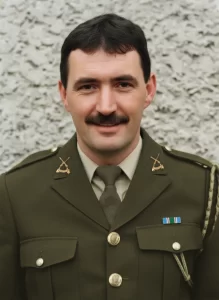 On 10 Jan 1987, Cpl Dermot McLoughlin was killed while serving with C Coy, 60 Inf Bn UNIFIL when a UN position in Brashit village (also spelt Baraachit) was hit by three rounds of tank fire fired by the Israeli Defence Forces (IDF) from Brashit compound, known as Charlie Compound. The IDF commenced firing from the compound at 2049 hours local time with tanks, mortars and heavy machine guns.
On 10 Jan 1987, Cpl Dermot McLoughlin was killed while serving with C Coy, 60 Inf Bn UNIFIL when a UN position in Brashit village (also spelt Baraachit) was hit by three rounds of tank fire fired by the Israeli Defence Forces (IDF) from Brashit compound, known as Charlie Compound. The IDF commenced firing from the compound at 2049 hours local time with tanks, mortars and heavy machine guns.
Cpl McLoughlin, who lived at Cairns Drive in Sligo, was 33 years old, he was married to Rosario (Holly) and they had five children, Philip, David, Louisa, Dermot and Owen. He had just returned from leave over the new year with his family in Sligo.
He had completed six years PDF service and he had previously served in Lebanon with the 54 Inf Bn from Nov 1983 to Apr 1984. His home unit was the 28 Inf Bn, Finner Camp, Co Donegal. He was buried in Sligo cemetery.
UNIFIL Force Commander, Maj Gen Gustav Hägglund (Finland) said “the firing was unprovoked” and lodged a strong protest with the IDF.
Irish Foreign Minister Peter Barry summoned the Israeli ambassador, Yehuda Avner, from London and he accused the IDF of attacking the Irish position deliberately.
Patrick O’Toole, Minister for Defence claimed the position was ″targeted knowingly″ and called it ″tantamount to murder″ by the Israelis. He said “It was irresponsible belligerence on an international force. There can be no doubt as to their intentions”.
The Israeli Defence Minister, Yitzhak Rabin and the IDF Chief of Staff, Lt Gen Moshe Levy, expressed their regrets to their Irish counterparts. Initially the IDF claimed that an initial investigation showed that the incident occurred after an Israeli army unit sighted “a large terrorist squad” in Brashit village. An IDF spokesman in Tel Aviv said, “the unit opened fire on the terrorists, and an Irish UNIFIL soldier who was in a structure close to the terrorist squad was accidentally hit”.
The Israeli Counsellor for Irish Affairs at the Israeli Embassy in London, Bruce Kashdan, in a press release, repeated the IDF story of terrorists in Brashit village.
In the face of international criticism, Israel changed its version of the attack.
On 14 Jan 1987, the Israeli chargé d’ affaires at the Permanent Mission to the UN wrote to the UN Secretary General, this is the text of that communication:
“Immediately following the tragic death of Corporal Dermot McLoughlin on 10 January 1987, the Israel Defense Force established an official Commission of Inquiry to investigate this tragic incident. A senior ranking officer in the IDF was appointed to head the Commission. In addition, the commanding officer of the Northern Sector is personally involved in the investigation. He views the incident with the utmost gravity and is supervising the work of the Commission.
The Commission’s preliminary findings include the following points:
- The UNIFIL post was misidentified as a terrorist position and was mistakenly fired upon by an IDF tank, leading to Corporal McLoughlin’s tragic death. An IDF soldier in the area conveyed to his commander that the target was a UNIFIL position, but the latter, new to the area and unfamiliar with the terrain, overruled his subordinate and gave the order to fire.
- The officer who gave this order was immediately removed from his post.
- New directives, designed to prevent the recurrence of such a tragic incident, have been issued to all IDF units in the area.
The Government of Israel has conveyed its heartfelt condolences and deepest sympathy to the family of the bereaved soldier and to the Government of Ireland”.
The killing of Cpl Dermot McLoughlin by the IDF occurred when there was no activity by Armed Elements (UN terminology for Lebanese resistance movements) in the area at the time. The Post was clearly marked as a UN position, the UN flag was illuminated, the Post Comd fired two red flares at the start of the firing to warn the IDF that the UN Post was being hit and to stop firing. From the early days of the mission, Approximate Map Reference (AMR) – an eight figure grid reference – for all UNIFIL positions have been provided and were regularly updated by UNIFIL HQ to the IDF Liaison Branch at Rosh Hanikra.
The Israeli designed Merkava main battle tank has been in service with the IDF since 1979 and with upgrades and improvements, in 1987, it had state of the art weapons sighting equipment including thermal imaging, day-night sight and a laser rangefinder.
Cpl McLoughlin was the 21st Irish peacekeeper to die while serving with UNIFIL since 1978 and he was the 129th UNIFIL fatality.
Two of Dermot McLoughlin’s sons, Phillip and Owen, continued the proud tradition of service to Ireland and to the UN by following in his footsteps, they served in 28 Inf Bn and with the UN.

